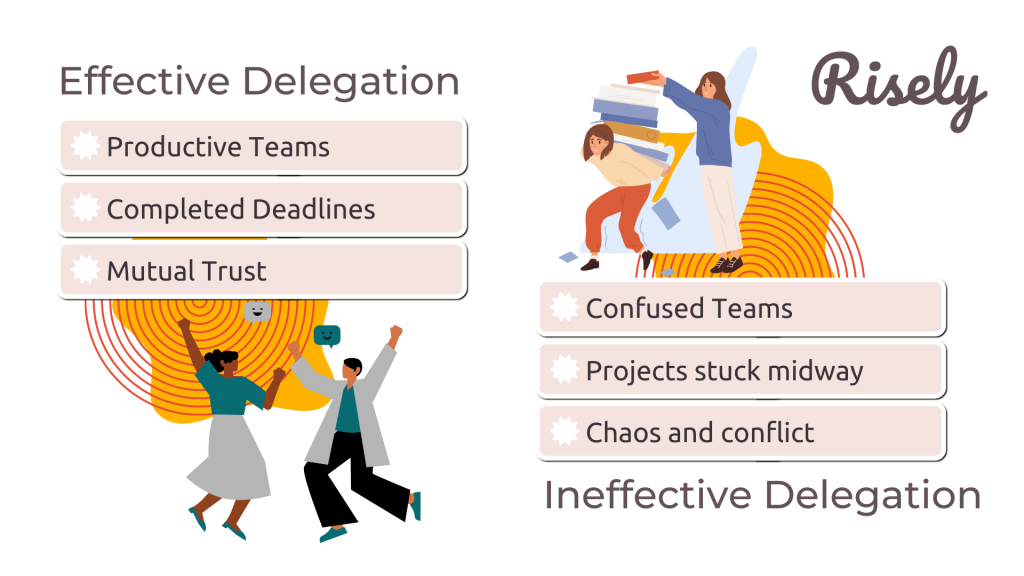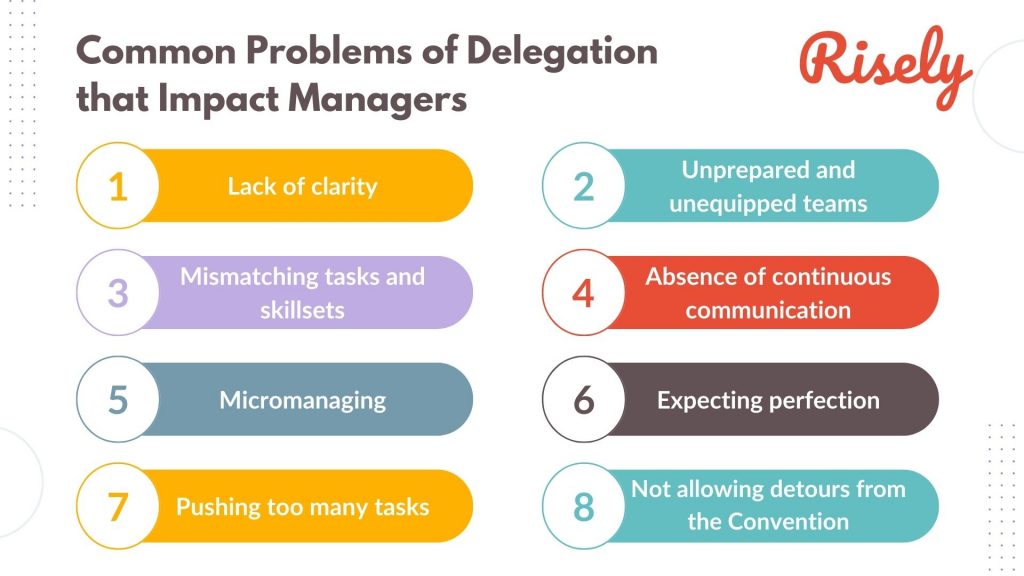8 Problems of Delegation that Hold You Back: How to Overcome Them?
What is one of the most critical and challenging parts of the managerial role? I think every manager will agree that allocating and delegating tasks is the most challenging task, hands down. When you, as a manager, can delegate the task to the right team member, it gives you the freedom and bandwidth to explore and think outside the box. However, if delegation proves to be ineffective, your work as a manager doubles. So, it is essential to understand the problems that hold you back as a manager. In this blog post, we will highlight the main problems of delegation and offer practical tips on how you can avoid them. By understanding the problems of delegation, you will be able to delegate tasks more effectively and efficiently – key ingredients for a successful managerial career!What is delegation, and why is it needed?
Delegation is an essential skill for leaders. It is the process of assigning tasks or responsibilities to other individuals. By designating someone else to carry out these duties, you free yourself up to focus on more important tasks. It can be a helpful strategy for keeping your workload manageable and minimizing stress in your life. It allows teams or individuals to work on more manageable and less time-consuming tasks. Delegation skills are needed because it allows managers to focus on more important tasks and helps increase overall productivity. When individuals can delegate effectively, they can better manage their time and resources more efficiently. Effective delegation allows people with different skill sets to work together cooperatively towards a common goal, which leads to improved communication and collaboration. Additionally, it reduces stress because each person has an understanding of their role within the overall scheme. Finally, delegating regularly builds stronger relationships with those around you and builds trust over time. This makes it easier for everyone when difficult decisions have to be made or new challenges arise down the road. All in all, effective delegation skills are needed to ensure that managers can focus on the right tasks while their teams continue to learn and build ownership. It enables a system that incorporates growth in every aspect. Read more about delegation and its benefits here: The Art Of Delegation: How To Master It As A ManagerWhat does effective delegation look like?
While delegation brings several benefits, it can create many troubles for managers and leaders when it is not done correctly. Hence, it is important to ensure that delegation practices of your team create efficiencies and not more problems to solve. In order to do so, we will start by highlighting a few key features of effective delegation, which are:Your team members are comfortable with the task
Having your team members on the same page as you is the key to ensuring that your delegation skills are effective. Effective delegation happens when the team members fully understand the task, its requirements, and its goals. Moreover, they are motivated to face challenges and are sure of their abilities. Support in the form of necessary resources, decision-making power, and training is also vital. Those tasks that your team members can regularly perform, even without instructions, are best suited for delegating. It works best when their duties align with their strengths and allow them to generate a sense of achievement – making their experience much more meaningful.You can trust your team
Delegating tasks to your team members requires a high level of trust. Effective delegation is all about delegating the right task at the right time to the right person, with clear expectations on both sides. You must be confident that your team members will complete the task as expected and meet your overall goals. Building trust takes time, but it is definitely worth investing in if you want successful delegation practices from your team. Suppose you are unsure of a team member’s competency. In that case, you will find yourself constantly worrying about tasks and might even begin to micromanage instead of providing guidance, which would set a harmful precedent. Hence, it is important to have faith in the abilities and values of your team when you delegate tasks. Therefore, choosing the right task to delegate also depends on the team. Read more: 10 powerful ways of building trust in the workplace that managers loveYour team gets the desired results
One of the keys to measuring the effectiveness of your delegation skills at work is that your team gets the desired results faster. By delegating, you are freeing your time to focus on more important matters. If you spend more time dealing with the task after handing it over to someone, it is a sign of failed delegation. Furthermore, delegation supports creativity and innovation as different people with different skills think differently and develop innovative solutions to problems they have never faced before – which can lead to better outcomes for your business overall. If you notice stagnation instead, it is a sign of improper delegation. Read more: Managers can make or break company growth.You find time to focus on high-value-generating activities
When delegating, it is key that you don’t delegate everything. You need to have a clear list of the tasks your team members can and cannot do to avoid any unwanted messes or interruptions. Delegating only the right tasks will allow you to focus on high-value-generating activities such as developing new products, services, or ideas. On the other hand, some tasks, like performance reviews, etc., cannot be delegated and should only be performed by the manager. If delegation is done wrongly and all work stops when someone gets assigned a task they are not skilled enough, this can lead to frustration and conflict within the team, ultimately decreasing productivity. By using delegation wisely, you should be able to focus on higher value-generating activities.
Is your delegation ineffective?
Now that we understand what effective delegation looks like, we can check whether we are going on the right path or not. Identifying ineffective delegation is vital. If you find yourself saying yes to most of the questions below, it is high time that you change your delegation practices at work:- The tasks you delegate do not get completed
- You complete the tasks yourself once deadlines have passed
- You worry about the tasks you have delegated
- Your team members are unenthusiastic about new tasks
- Your team members feel burdened and unequipped
- You take too many updates on tasks
- Your team cannot understand the end-goal
OtherInterestingReads
What are the common problems of delegation that impact managers?
Delegation can be a great way to save time and boost efficiency. However, it’s important to be aware of the pitfalls of delegation so that you can save time and maintain the quality of the work. Some of the common reasons for failure of delegation and steps to avoid them are listed here for managers:
Lack of clarity
If the team doesn’t understand why a task has been delegated, it can lead to frustration and conflict. This is because people take their tasks personally when they don’t feel like they’re part of the bigger picture. It also makes them think that their activities are inherently meaningless, in turn demotivating them further. Delegating tasks that are easily understood will help your team stay on track and optimize productivity. How to improve clarity in delegation?- Explain the purpose, method, and utility of the task to your team
- Create a timeline that envisages long-term goals
- Show them how their efforts add value to the team
Unprepared and unequipped teams
If your team members don’t have the necessary skills or equipment to complete the task, it can become very difficult for them. This is because they’ll be unable to complete the tasks independently. If tasks are delegated without proper preparation, your team will waste time figuring out how things work and get defeated before they even start. Conflicts and chaos from improper delegation can drive teams away from their goals. How to equip your teams for effective delegation?- Equip your team with the tools and resources they need
- Provide training on task completion procedures
- Be open to queries and provide guidance
Mismatching tasks and skillsets
If the tasks assigned to your team are too far apart from their skillset, it will be difficult for them to work rapidly. It is because they will have to spend significant time figuring out things from scratch, as the tasks vary highly from their routine work. Additionally, their skill sets will be less effective alone if the task needs multiple skills. If you delegate tasks that are too complex or challenging, your team members may become discouraged. How to ensure successful delegation?- Know the strengths and weaknesses of your team
- Match task difficulty with team skills
- Encourage cross-functional collaboration by creating a shared goal where different members can collaborate
Absence of continuous communication
If team members are left alone with a task without continuous support from the manager, they can end up feeling directionless and unmotivated. As their efforts are not recognized regularly enough, the employees might feel unvalued in the team. The problem can happen when team members do not communicate with each other too. If the team members don’t have regular communication with each other, tasks can become backlogged and forgotten. As tasks get pushed back further, it becomes increasingly difficult to coordinate work among the team members. How to improve communication in delegation?- Take regular updates and feedback, and ask questions
- Make sure task deadlines are enforced regularly
- Utilize effective communication tools that work both ways
- Focus on positive communication to keep the team going
Micromanaging
This issue in delegation skills occurs in the opposite scenario of the above. It can become burdensome if the manager constantly checks in on the team members. Micromanagement often interrupts work and makes it difficult for team members to focus on their tasks. Additionally, this unnecessary supervision can create a sense of distrust among some employees, which might lead to contradicting or sabotaging efforts altogether. How to reduce micromanagement in delegation?- Maintain communication but respect boundaries
- Establish limits to ownership of tasks that you follow as well
- Balance autonomy, build accountability, and trust your team
Expecting perfection
Tasks that are delegated should not be expected to be perfect. As the task is given to a team member, they cannot control factors such as time and resources, which might affect the outcome of their work. Additionally, delegation skills alone will not solve the problem if team members do not share enthusiasm for the task. If everyone on the team is reserved about taking part in a delegated task, it can lead to stagnation and, ultimately, failure of the project. How to achieve success with delegation?- Encourage delegation but also provide feedback
- Set and identify goals for the team that are achievable
Pushing too many tasks
If the team is not given enough time to complete a task, they might feel overwhelmed, which is an important sign of improper delegation. This management style often results in work piling up and ultimately creating more problems than it solves. Additionally, the team might become overworked and unproductive if too many tasks are delegated without adequate planning. How to find balance in delegation?- Understand the capacities of the team
- Delegate tasks in manageable units
- Take feedback from the team on tasks
Not allowing detours from the convention
The team might become bogged down in the typical way of doing things if they are not allowed to take any detours. It can lead to a sense of stagnation and, eventually, failure. Additionally, the leader needs to be clear about what is expected from the delegation and make sure that tasks are broken down into manageable units so that everyone understands their specific part of the overall project. How to become flexible in delegation?- Specify methods but encourage and allow innovation too
- Identify the core values that cannot be abridged
- Be open to new ideas and leave the rigidity

How to deal with challenges in delegation of authority?
Delegation is not a single-faceted picture but carries many levels. While delegation of tasks is the simplest and most common form, another area that managers need to focus on is delegation of authority. Often, managers face challenges in the delegation of authority due to these reasons:- Fear of losing control: Managers may worry that delegating tasks means relinquishing control over outcomes, leading to uncertainty and anxiety.
- Lack of trust: Managers might be reluctant to delegate authority if they don’t trust their team members’ capabilities or commitment to the task.
- Perfectionism: Some managers believe that only they can complete tasks to their desired level of perfection, leading them to hesitate in delegating.
- Time constraints: Managers may feel it’s quicker to do tasks themselves rather than invest time explaining and monitoring others’ work.
- Accountability concerns: Managers could be apprehensive about being held responsible for their team’s mistakes or poor performance when delegated tasks.
- Micromanagement: Managers may excessively monitor and control employees, inhibiting their autonomy and creativity.
- Task hoarding: Managers might hold onto tasks they should delegate, leading to a backlog of work and decreased overall efficiency.
- Underutilization of the team’s skills: When managers don’t delegate appropriately, employees’ skills and potential remain untapped.
How to deal with challenges in the delegation of authority?
- Build trust: Develop trust in team members by providing clear expectations, support, and feedback to foster a sense of confidence in their abilities. Start with small, less critical tasks and gradually increase the level of responsibility as trust builds.
- Identify the right tasks and candidates: Determine functions that are suitable for delegation based on employees’ skills and interests. Managers can create a priority list of core and subsidiary functions and decide what to delegate based on it.
- Communicate effectively: Communicate tasks, deadlines, and expectations to avoid misunderstandings and ensure successful outcomes.
- Provide training and resources: Offer training and resources to enhance employees’ skills and enable them to handle delegated tasks effectively. Activities such as job shadowing and mentorship before transferring responsibilities can help reduce anxieties on both ends.
- Empower decision-making: Allow employees to make decisions within their delegated authority, encouraging a sense of ownership and responsibility.
Conclusion
Effective delegation is one thing that can make or break your team. Many companies have been left behind in the race for success when they did not manage this issue well. Improper delegation plagues efficiency in otherwise successful teams. To overcome such issues, it is important to know the pitfalls while delegating tasks and responsibilities to new employees. Take time to take our free self-assessment on effective delegation now and prepare for improved performance with the free effective delegation toolkit too!Are you struggling to effectively delegate tasks and optimize efficiency in your team?
Download our free effective delegation toolkit now and learn how to solve this problem quickly and easily.
Frequently Asked Questions
What are the challenges of delegation?
– Loss of control: Managers may fear losing control over tasks or outcomes when delegating to others.
– Quality concerns: There’s a risk of subpar results if employees lack the necessary skills or experience.
– Time investment: Initially, delegation might require more time to explain tasks and monitor progress.
– Accountability: Managers can be held accountable for their team’s actions, leading to reluctance in delegation.
– Quality concerns: There’s a risk of subpar results if employees lack the necessary skills or experience.
– Time investment: Initially, delegation might require more time to explain tasks and monitor progress.
– Accountability: Managers can be held accountable for their team’s actions, leading to reluctance in delegation.
What are the disadvantages of delegation?
The major disadvantage of delegation is that ineffective delegation can hamper the quality of work quite significantly. It can reduce productivity if untrained team members are held responsible for major tasks.
What causes failure of delegation?
The most common cause of failure of delegation is lack of training. Team members need to be trained and assessed before they are handed responsibilities independently. Managers should be aware of their skill sets before sharing tasks.
Why do you think managers have difficulty delegating? What can be done to overcome these difficulties?
Reasons for managers’ difficulty in delegating:
– Perfectionism: Fear of tasks not being executed to their high standards.
– Lack of trust: Managers may not trust their subordinates’ abilities or reliability.
– Micromanagement: A tendency to control every detail can hinder delegation.
– Insecurity: Fear of being outperformed by subordinates can lead to non-delegation.
Overcoming delegation difficulties:
– Training: Provide training and support to employees to boost their capabilities.
– Clear communication: Ensure tasks are well-defined and expectations are explicit.
– Gradual delegation: Start with less critical tasks to build trust and confidence.
– Trust building: Encourage open communication and demonstrate trust in team members’ abilities.
– Perfectionism: Fear of tasks not being executed to their high standards.
– Lack of trust: Managers may not trust their subordinates’ abilities or reliability.
– Micromanagement: A tendency to control every detail can hinder delegation.
– Insecurity: Fear of being outperformed by subordinates can lead to non-delegation.
Overcoming delegation difficulties:
– Training: Provide training and support to employees to boost their capabilities.
– Clear communication: Ensure tasks are well-defined and expectations are explicit.
– Gradual delegation: Start with less critical tasks to build trust and confidence.
– Trust building: Encourage open communication and demonstrate trust in team members’ abilities.
Other Related Blogs
A Decade in Making: Decoding Shyam Gor’s Managerial Approach
A Decade in Making: Decoding Shyam Gor’s Managerial Approach “People don’t leave companies, they leave managers.” We have all heard this adage over the years. Shyam Gor is a manager…
Grooming for Management: The Key to Building a Sustainable Leadership Pipeline
Grooming for Management: The Key to Building a Sustainable Leadership Pipeline Imagine a crucial leadership position opening up in your organization. You scramble to fill the role, internally and externally,…
Looking For a Delegation Coach? 10 Delegation Training Courses at Your Fingertips for quick learning
Looking For a Delegation Coach? 10 Delegation Training Courses at Your Fingertips for quick learning Delegation is a cornerstone skill for any manager or leader aiming to foster team growth…
5 Impactful Leadership Coaching Styles For Your Team
5 Impactful Leadership Coaching Styles For Your Team Have you ever wondered what sets great leaders apart from the rest? It’s about more than just authority or expertise but their…


